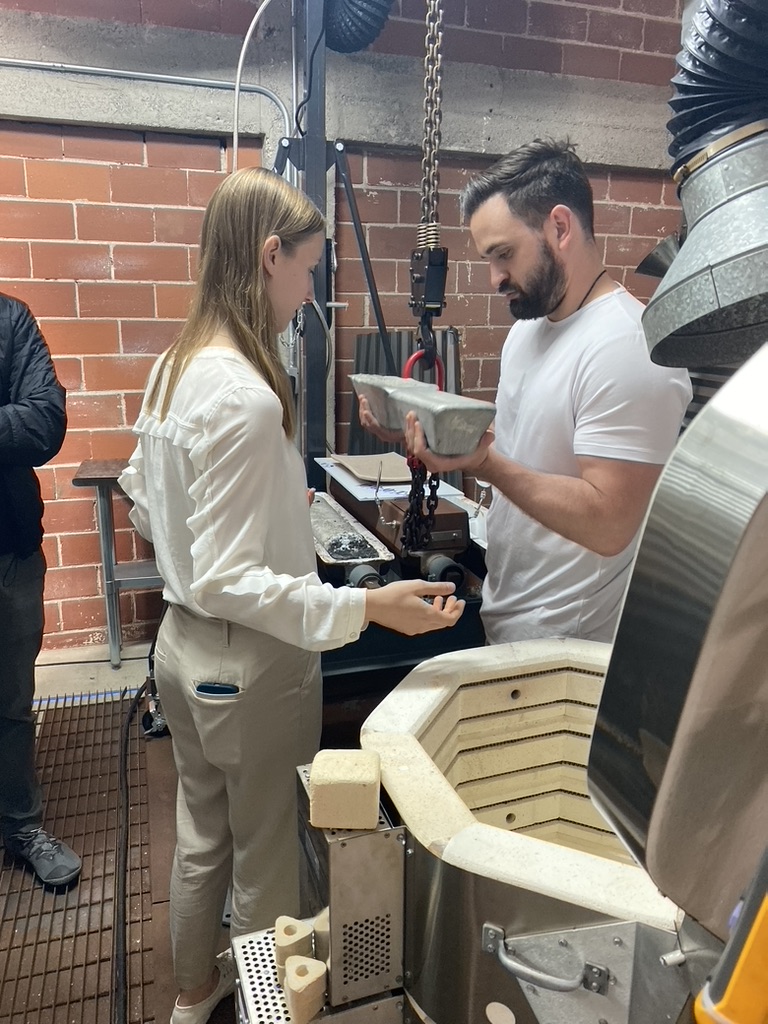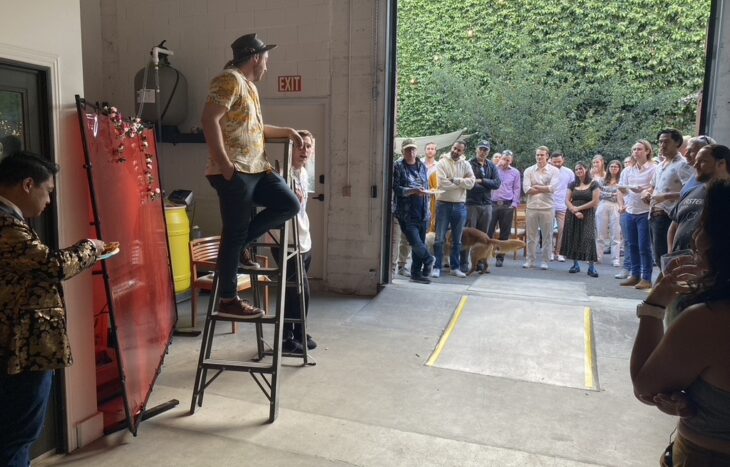Magrathea, a start-up company located in Oakland, CA, completed its seed round, raising $10 million to make magnesium metal from seawater and brine using an innovative new technology. Alex Grant, CEO, refers to this technology as the world’s “new generation of electrolytic process” to make carbon neutral magnesium. An event on July 7, 2023, at Magrathea’s pilot plant celebrated the company’s fundraising accomplishment with a dinner and networking event, where Grant, using a magnesium ladder made by Dow from seawater in the 1950s to see over the crowd (pictured above), thanked investors, supporters, and staff, with Jacob Brown, cofounder and CTO, by his side.
The seed round was co-led by VoLo Earth and Capricorn Investment Group. The syndicate includes Valor Equity Partners, Exor Ventures, Counteract, Hyperguap, Necessary Ventures, Untitled, EQT Foundation, and other recognized technology investing leaders with global industrial connectivity. Capricorn and Valor are both early investors in Tesla and SpaceX, with Valor currently having a seat on SpaceX’s board. Exor Ventures is the early stage investment arm of Exor, reference shareholder of vehicle makers Ferrari, Stellantis, CNHI, and IVECO. Counteract invests in carbon dioxide removal scale-up. Untitled is focused on industrial transformation and is backed by the Tetra Laval family. Magrathea is the first Silicon Valley technology startup to ever raise significant capital for magnesium metal process development.
“Magnesium metal supply underpins trillions of dollars of trade, and national security is impossible without it,” said Grant. “Further, being so essential for light metal, magnesium has a lead role to play in making electric vehicles cheaper, higher performance, and more efficient, reducing pressure on battery supply chains. We’re excited to have the most respected technology investors on Earth see what we see: magnesium is the metal of motion. We’re honored to have their belief in our mission and team.”

Magrathea produced its first Magnesium ingot in 2022. As far as next steps, the company is focused on delivering 2 tonnes/year nameplate capacity at their pilot plant. After that, Magrathea will build a demonstration plant, in which they hope to prove their new generation of technology at a commercial scale. If all goes according to plan with the proposed demonstration plant, they will build their first commercial smelter in the U.S. and eventually also Europe.
Company Background
When asked how the company got interested in the Magnesium business, Grant gave some history about co-founder Brown who had worked at Alcoa in Perth, Australia, before finishing his undergrad degree in chemical engineering, “He was always interested in aluminum as a ‘future metal’ because 30% of its cost structure was dependent on electricity,” said Grant. “After completing his PhD at Cambridge, Brown ended up in California building the cathode pilot for Tesla’s cell program, and at Tesla he mentioned the aluminum cost structure to a colleague. That other engineer asked if he knew much about aluminum’s light metal brother magnesium, whose cost structure is not 30% electricity but more like 70%.”
Grant’s previous work includes co-founding Lilac Solutions, Inc., where he co-invented core families of patents on different aspects of Lilac’s technology for lithium extraction from brines and led work on engineering scoping studies for lithium project developers. That company has raised $250M as of 2023, and now has a team of hundreds of people. He was also the principal at Jade Cove Partners, a company that supports stakeholders to evaluate new technologies in materials, mining, and water industries.
Drawing on their combined experience in the metals and minerals industries, Brown and Grant realized that magnesium had great promise for becoming comparatively much lower cost than aluminum and maybe even steel in this era of decarbonization. Further, with solar and wind power, electricity is becoming less expensive. The pair also recognized the importance of lightweighting for electric vehicles and decided magnesium was the obvious choice for radical lightweighting.
To learn more about the company: www.magratheametals.com.

